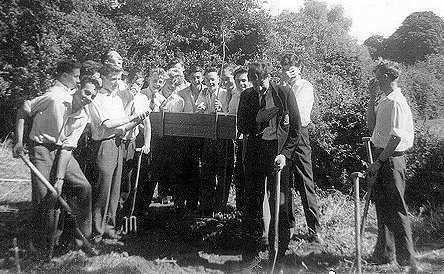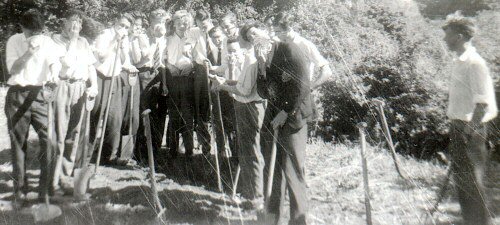To telescope the events of twenty-seven years of a schoolmaster's life into a necessarily short article in the final issue of the Soham Grammarian, when pressure on space is bound to be heavy, is a near impossible task. Selection is inevitable and one is not helped by the certain knowledge that an entirely different selection would have been preferred by most of, if not all, one's readers.
The effect of Soham Grammar School on me, when I came to the school for the first time in July 1945, was both instant and profound. I had come, with six or seven others, to look over the school before the interview next day at which the new headmaster was to be selected. It was a lovely Summer day, there was an air of purposeful activity about the school and the lawn and grounds were looking their best.
As a countryman who had been brought up in a village on the edge of the Pennines and whose own schooldays had been in a country grammar school similar to Soham Grammar School I felt immediately that here was a place I would find both happiness and fulfilment if I should be fortunate to be selected next day. That I was selected is history, that I have, with my wife and family, been intensely happy here is a statement of personal fact which I make with gratitude to all, boys and masters alike, who helped to make it so.
It was a baptism of fire indeed in the art and practice of headmastership. There were four vacancies out of a staff of eight to fill as well as a secretary and a caretaker to appoint and there was the immediate need to find a house for my family to occupy. It is said that the prime art of all management is delegation and I had to learn that fast. While I attended to the needs of the school my wife was deputed to find a house. The choice boiled down to two - one was one of the smallest cottages in Soham and the other was virtually the largest house. Being a prudent Yorkshireman I was for taking the smallest cottage but my wife was made of sterner and more adventurous stuff. She was for taking the largest house on the grounds that 'we can always do something with a large house but nothing at all with a small cottage'.
So we came to The Moat, which had been a Red Cross Hospital during the war and which proved to be ideal for starting the present school Boarding House which we did with eight boarders Routledge (Stretham), Whetstone (Wilburton), Ward (Ely), Leggett and Nunn (Sutton), Faircliffe (Burwell), Bullman (Swaffham Prior) and Williamson (Littleport) in September 1946. Inevitably some of my happiest memories are associated with the boarding house - cricket on the lawn in Summer, table tennis in the play room in Winter, the Christmas party with the inevitable game of 'scissors' replaced recently by 'I stand this pencil on one end ....'
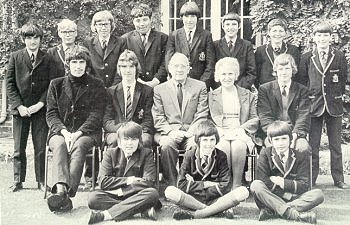
BOARDERS 1972
(please click on image for a larger version with key)
source: School History
It is not quite true to say that I was never beaten at table tennis because both Howie Docherty (a few years ago) and Vincent Gudgeon (more recently) managed to do so on more than one occasion and I believe Hugh Wilderspin might have done (I cannot remember but if he did I am certain he will). The boarders have always claimed that, being boarders, they were 'marked men' and certainly one master has always put a large B beside the name of any boarder in his mark book. Certainly they have been 'marked' in three proud ways. A boarder ('Muggy' Watson) was the second winner of the Bacon Cup and another boarder (Simon Thornhill) is this year the sixth winner of the more recent Stubbs Cup, while David Crowe was Head Boy in 1959.
One of the biggest decisions I have ever taken at Soham Grammar School was made after 'enduring' only two terms of painful rugby by the school when our so-called first XV was beaten into the ground by second and third XV's from the Perse and Cambridgeshire High School - the only schools within twenty miles of the school playing rugger, and therefore our only fixtures. It was necessary I felt to match the school on equal terms with schools of comparable size and at the game they played. Hence the decision to turn over to Soccer and play Wisbech, March, Huntingdon, Newmarket, Bury St. Edmunds and Newport Grammar Schools.
I, and the school, had a tremendous stroke of luck in that at that precise moment who should apply for a history/geography post at the school but the great R.A.T.? Everybody knows the subsequent story of Soccer (and cricket) at Soham Grammar School - when we became a real power in the school games world. I remember one Saturday morning five games were being played against March Grammar School at all ages from 11 to 18. We won every match with an aggregate score of 45-3 (and R.A.T. even had a word to say to those who were 'responsible' for the 3!).
Who, who was there, will ever forget the 'needle' matches at both cricket and football against Newport Grammar School? Mr. Taylor's brother was in charge of games at Newport and no quarter was ever given by either boys or the master-brothers and none was uselessly asked. Once on a snow covered Soccer ground our first XI couldn't keep their feet and Newport could and so we lost 10-0 at home. On Monday morning ..... Adequate revenge was not to come our way for some time but it did eventually and it was savoured to the full, not only by R.A.T.!
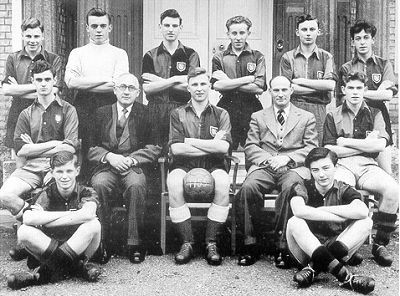
First XI 1955 : P14 D1 W13 L0
AG Cox - CH Cobbin - RA Dennis - CF Cropley - EJ Aspinall - AH
South
GL Burton - EA - JL Scotting - RAT - RE Guiver
AW Moore - GJ Gammon
source: School History
Three generations of schoolboys (i.e. 15 years) have enjoyed the gracious Assembly Hall with its pleasing outlook towards the Rose Garden and its Clock Memorial, designed by Peter Askem, in memory of Mr. B. M. Bacon, Chairman of Governors 1953-58. But there are many generations of Old Boys, as well as four still on the staff, who recall the former Assembly Hall (now the Exhibition Area) with its glass roof and interior supporting pillars, its tiny stage on which miracles were performed with such mighty productions as Hamlet and Yeoman of the Guard.
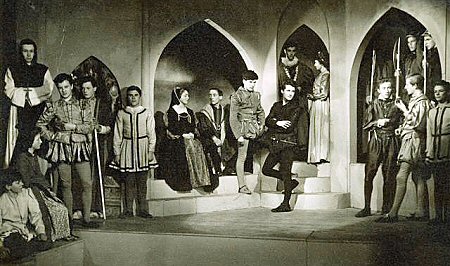
HAMLET 1956 source: School History
Two other memories of the old Assembly Hall must suffice. One hot Summer morning, after the morning service was over, I was for some good but now forgotten reason giving forth on the subject of common injuries and their first-aid treatment (probably it was the prelude to a collection for the Red Cross). I must have been unusually eloquent, or the sun too hot, or small boys' imaginations too vivid, but no fewer than seven boys passed out!
On another occasion - the last Assembly of the Summer Term - I was in full flight addressing the school when I suddenly caught sight of a prominent member of the Lower Sixth. It was 1954, years before long hair, even before skinheads and Teddy Boys, and crew cuts had just come on the scene but not in schools and in particular not, until that moment, in Soham Grammar School. There was ------- in a crew cut. My speech was cut short in mid flight, while I delivered an extempore condemnation of crew cuts and all they stood for. All I can say now is what wouldn't I give for some good honest-to-goodness crew cuts among the untidy long-haired members of today's Sixth Form and to ------- (who, incidentally, still favours the crew cut) I offer: 'All is forgiven; I knew not then what lay in store for me and schoolmasters everywhere'.
What boy who took part will ever forget the Summer of 1958 which began for Soham Grammar School with the last Assembly of the Easter Term, when I announced that the school would next term raise £1,000 towards the cost of a new cricket pavilion? Wages were on average less than £10 per week, cottages could be bought for hundreds (not thousands) of pounds and the average church or charity fête then raised less than £100. It was not surprising that the school was stunned at the hugeness of the target and that their only immediate reaction was a series of genuine gasps of incredulity.
It is just another historical fact that the target set was handsomely exceeded and the mammoth effort summed up on Speech Day in the headmaster's report as follows: 'Retrospective reflection on the part of many who are qualified to judge puts the success of the whole project as due in no small measure to the hugeness of the target which was set - it was thought, apparently by all concerned, that it had so little chance of being reached that they might as well make a special effort in order that the failure might not seem so great. The School received the most wonderful support from all concerned - in fact from 'Governor, Master, Parent, Son' and this is my opportunity, which I gratefully seize, of saying a heartfelt thank you to you all. Quite undismayed by the size of the target set, you parents dipped into your pockets and rallied round the project in a truly magnificent manner.
And if I may finish on a light note - it wasn't until after the day was over and the target reached that I realised I had the perfect answer to any boy who dared ask, after the manner of boys, 'What exactly did the Headmaster do towards the Summer Fair? He got the parents to do a lot of hard work and the staff to do a lot of organising and the boys to do a great deal of, at times, very unpleasant jobs but what exactly did the Headmaster do himself?' Well here is my answer - 'I chose the day on which the Fair was held', and anybody who was there will recall that the sun beat down from a cloudless sky and that it was the hottest and best day of that entire Summer.
Those who were there will not need to be told how we did it. Others might like to read Richard Tassell's poem about it in the Soham Grammarian for Summer 1958 of which a section runs:
Why does Daly diet all Wood Ditton
On self-cultivated cress? Why does Mitton
Cause the streets of Cambridge to resound
With the clatter of Old Iron, begged or found?
'Commerce, how is it that thou holdst such sway
O'er all the hours that Boys reserve for play?'
And in reply: 'Beware how you employ your pen and tongue
The Cause is sound, has its praises sung,
Is served, by Governor, Master, Parent, Son
The Aim of all this strife is a "Pavilion" '.
Another memory of the 'autre temps autres moeurs' genre. Present Fifth and Sixth Formers who leave school immediately after their examinations are over in order to slave for monetary gain at petrol pumps, pea picking and labouring jobs of all kinds, know nothing of the pleasure of previous generations who always returned to school to savour the delight of being, for a precious three weeks, 'gentlemen of leisure'.
The principle accepted by both sides ('us' and 'them') was appropriately a gentleman's agreement. If they, the boys, would work for about half the morning and occasionally when needed in the afternoon at some useful manual job we had found for them, we (the staff) for our part would turn an obliging and indulgent eye (a schoolmaster's eye may be obliging and indulgent, it is never, never blind!) on their slothful activities for the rest of each day.
Each year some worthwhile job was found: ditches were cleared, the shrubbery tidied, fences repaired and everybody benefited. One year we undertook the clearance of the dense shrubbery that there then was between the biology pond and the front gate. The result was a place of beauty, not unlike the Backs at Cambridge, for the delight of subsequent generations and a daily delight to me for the past ten years from my study window.
One other memory of those days. We had a Frost Report at Soham Grammar School long before David Frost arrived on the television scene. It was commissioned by me after an Old Boys' Dinner at which many of the principal figures in the incident described in the subsequent Report were present. The incident referred to was one that most of those at Soham Grammar School had heard about but of which the exact details had always been missing.
So, seizing what was obviously the perfect opportunity - when after a good dinner and appropriately nostalgic speeches contemporaries gathered in little knots to reminisce about their particular time at school - I approached Frost, Cornwell, Morton and Deasley (names which, Deasley perhaps excepted, still strike a certain chill into the hearts of many masters of their day) and suggested that it was about time the incident of the 'cricket box' passed from legend into historical fact duly attested by the participants themselves.
To my delight they readily agreed and Alan Frost duly undertook the compilation of the now famous Frost Report. The Report itself is dated January 25th, 1965, but the incident it refers to is the Summer of 1959. It has never before been published, though I have more than once read extracts from it at Old Boys' Dinners, and, as no transcription of it could give the same flavour as the author's own felicitous words, it deserves to be given in full.
"Dear Sir,
Thank you for your letter of the 22nd asking for details of the interment of part of Mr. Taylor's proud stock of games equipment. I only hope that I can make the story worthy of characters such as Brickwood, Naylor, Allen and others who were prominent mourners.
You may recall that it was the custom (and still may be) for the fifth form to be set some menial task after the 'O' level examinations each summer. It fell to the lot of our year to be given the task of clearing the perimeter of the games field, Mr. Riley having, no doubt, assumed that even Brickwood could do little damage in such wild surroundings. It would, however, have been extremely unusual if a form harbouring such criminal names as the above mentioned, plus several reserves of note, could not have risen to the occasion.
Sure enough, someone saw an opportunity to make use of the earth-levelling equipment in an extremely useful manner and at the same time to score off a redoubtable enemy who had inflicted many telling blows in the past.
The result you know, of course. One of Mr. Taylor's cricket boxes was solemnly borne by four mourners from the old games hut to a large hole which had been lovingly prepared for it. As can be seen in one of the enclosed photographs Allen was appointed to perform the last rites. He is seen reading from the school prayer book (which in itself was a novel experience for one who arrived late at school so often as Allen).
After Naylor had sprinkled ashes on the coffin the hole was covered and the ground levelled. I must apologise for the looks of glee on the faces of one or two of the mourners: but this is understandable from people who had such a love of games as to have their own points system on sports day; points were awarded for being told to leave the games field and even more points for actually being kicked off; while the skilled athlete who could manage to put the shot actually onto a certain master's head was to receive not only the Victor Ludorum but also the Frost-Cornwell Memorial Prize.
The look of sadness on one or two faces may be due to the fact that only cricket had equipment that could be buried; cross-country running involved no such accessories.
The story had an interesting sequel some weeks later when Mr. Taylor burst into one of our Chemistry periods just before the start of the lesson. He glared around the room then pointed to Cornwell and myself and said, 'I don't want to know who did it. Frost and Cornwell find it and dig it up'. We did manage to find the box after some exploratory digging and recovered it in a state of ill-repair, Phelps having driven the tractor over the ground several times. Mr. Taylor's comment was, 'Repair it and no more will be said'.
He was as good as his word and after being treated to the sight of Cornwell knocking screws in with a mallet (Mr. Tabraham will no doubt be happy to explain the significance of the underlinings) the incident was closed.
You might have some difficulty in recognising one or two souls on the photographs.
Reading from left to right on photograph 1 are John Cornwell (with spade), Peter Deasley, Colin Murray, Geoff Allen (with prayer book), Chris Naylor (obviously delighted), Brian Halls, myself, Michael Brickwood, Michael Morton, Gordon Duffield, David Christie, Martin Shalders, David Plaice, Barry Ellingham (deeply touched), Paul Rolph (hiding his identity) and John Badcock. ['photo 1', courtesy of John Cornwell: first names added by Editor] On the second photograph [below] are Rolph, Gregory, Murray (?), Deasley, Morton, myself, Brickwood, Naylor, Halls, Shalders, Christie, the Rev. Allen, Ellingham (obviously by now almost overwhelmed with grief), Plaice, Cornwell and Badcock.
'photo 2' : source Alan Frost, via John Cornwell
I hope that the above is sufficient. I have checked with Deasley who agrees that I have remembered most of the details correctly. Please excuse the grammar and style of a would-be engineer.
Yours sincerely,
Frost"
As a footnote to the above I add that the writer went on, with four others mentioned in the escapade, to University to become engineers or physicists or chemists. (The physics master of the time was the headmaster, the chemistry master the deputy head and the mathematics master the Warden of the Village College into which rather astonishing series of facts no doubt much can be read.) Two others are teachers in the service of the Cambridgeshire and Isle of Ely Education Authority and one is an officer in the Army. All were highly intelligent schoolboys whose individuality merged on occasions into a corporate spirit of adventure against authority that gave a certain spice to life and it needed schoolmasters of the calibre of R.A.T. to deal with such 'criminals' in the forthright manner described which ensured a quick return to law and order while leaving no ill-will on either side.
When looking back over a long period of time it is almost inevitable for the traditional rose-coloured spectacles to be used for the operation. Down memory lane is always a fascinating journey and when the lane is as long as twenty-seven years at Soham Grammar School it is one that, though undertaken in his busiest term of all, has given the writer intense pleasure, a little of which he hopes he has communicated to all his readers but especially to those who shared with him the action when it was taking place.

ACADEMIC STAFF 1972
(please click on image for a larger version with names)
source: School History
